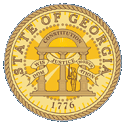Today at the state Capitol, Gov. Nathan Deal signed two pieces of ethics legislation that will bolster Georgians’ confidence in their state government. The first bill, House Bill 142, restores rulemaking powers to the Georgia Government Transparency and Campaign Finance Commission, more clearly defines the role of a lobbyist, and sets the first cap on legislative lobbying spending. The second, House Bill 143, the companion to HB 142, requires more transparency in regard to campaign fund-raising and spending during certain local races, and it ensures that the public knows about any campaign donations given to members of the General Assembly leading up to the start of the legislative session.
“I have enacted these bills to strengthen ethics laws in our state because the public demanded it and good government longed for it,” said Deal. “Our success as leaders of Georgia depends heavily on the public’s ability to trust us. Georgians are correct to insist that the voices of the people echo louder under the Gold Dome than the narrow views of special interests. Together, these bills constitute a major step in improving ethics, trust and transparency in our state.”
HB 142 overhauls the ethics laws relating to public officials and employees by giving regulatory authority back to the Georgia Government Transparency and Campaign Finance Commission, and defining lobbyist expenditure as the following:
• Any expense exceeding $75 for transportation, travel, lodging, registration, food and beverages.
• Tickets for admission to athletic, sporting, recreational, musical concert or other entertainment events, unless face value is paid by the recipient.
• Recreational or leisure activities.
The bill also prohibits any expenditure by a lobbyist except:
• Widely distributed promotional items.
• Food and beverages produced in Georgia.
• Awards, plaques, certificates or mementos.
• Discounts, upgrades, memberships, or other accommodations extended by a business to a bona fide customer.
• Legitimate salary, benefits, fees or commissions associated with recipient’s nonpublic business.
• Campaign contribution.
• Food beverages and registration at group events (entire agency, entire General Assembly, full House, full Senate, standing committees of each body, majority and minority caucuses of each body, any group approved by the Commission).
• Reimbursement or payment of actual and reasonable expenses for the cost of attendance at a educational, informational, charitable or civic meeting or conference held within the United States and directly relates to the official duties of the public officer, plus food and beverages for such public officer. Spouse and staff are included.
Defines “lobbyist” as the following:
• Person who receives or anticipates receiving more than $250 per calendar year in compensation or reimbursement, specifically for undertaking lobbying.
• Person who makes a total lobbying expenditure of more at $1,000.
• Person who is compensated specifically for undertaking lobbying.
Furthermore, it requires that all lobbyists must register with the commission before commencing lobbying activities, adds a new requirement for lobbyists disclose any state agency they will be lobbying in an attempt to influence rulemaking or purchasing. However, registration provisions do not apply to:
• Citizens who communicate their own personal views, interests or professional opinions.
• Employees or independent contractors who solely participate in soliciting a bid or preparing a written bid.
• People invited to testify by Legislature.
• People invited to testify by public agency or governmental entity.
• Officials of a business or group that employs a lobbyist, if that official is not compensated for lobbying and does not incur $250 of expenditures per year.
• Attorneys representing clients when such attorney is not paid specifically for lobbying
• Public official or officer
• Public employee, aide or intern who performs services at direction of General Assembly
HB 143 focuses primarily on campaign finance and:
• Adds “attorney fees connected to and in furtherance of the campaign” to the definition of “ordinary and necessary campaign expenses.”
• Requires all county and school board candidates to file campaign contribution and campaign expenditure reports with the county election superintendent.
-Exception: Candidates who do not raise or spend greater than $2,500.
• Requires all municipal candidates to file campaign contribution and campaign expenditure reports with the municipal clerk.
-Exception: Candidates who do not raise or spend greater than $2,500.
• Requires significantly earlier disclosure of all campaign contributions greater than $100 received by a member of the General Assembly between Jan. 1 and the commencement of session. Those donations must now be reported by Jan. 31, as opposed to March 31.
Deal called for changes to state ethics laws during his State of the State address in January.
